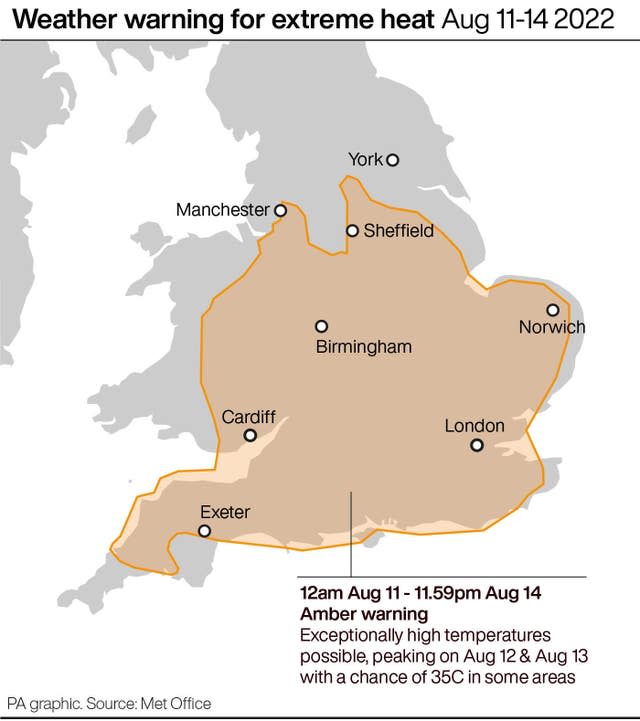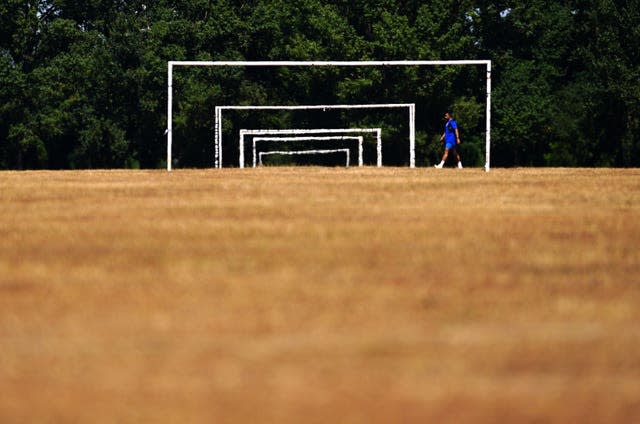Drought expected to be declared for parts of England as heatwave scorches UK
Drought is expected to be declared for some parts of England, as another heatwave scorches the country after months of low rainfall.
Warnings are in place over the health impacts of extreme heat and the risk of wildfires, as temperatures are expected to climb as high as 36C in some areas.
The National Drought Group – made up of Government and agency officials, water companies and other groups such as the National Farmers’ Union (NFU) – is set to meet on Friday to discuss the prolonged dry weather.
There are expectations drought could be declared for the most affected areas of England in the south and east, after the driest July on record for some areas and the driest first half of the year since 1976.

The ongoing dry conditions, combined with last month’s record-breaking heatwave, have depleted rivers, reservoirs and aquifers and dried up soils, hitting agriculture, water supplies and wildlife and raising the risk of wildfires.
Declaring drought will see the Environment Agency and water companies implementing more of their plans to manage the impacts of low water levels, which can include actions such as hosepipe bans.
Four water companies in England and Wales have already brought in hosepipe bans or have signalled their intention to do so, while the Wildlife Trusts have called for an England-wide hosepipe ban to protect nature and rivers.
Meanwhile, a four-day amber warning for extreme heat from the Met Office is in place for much of England and Wales until Sunday, with warnings of health impacts and disruption to travel.

There is also a heat health alert in place from the UK Health Security Agency, with experts advising people to look out for those who are older or with existing health conditions, as well as young children.
Temperatures reached 34.2C at Wiggonholt, West Sussex, on Thursday afternoon, and climbed above 33C in a number of places from Shropshire to the south east of England.
Heatwave thresholds – which are met at different temperatures in different parts of the country – are likely to be hit in much of the UK.
Met Office chief meteorologist Andy Page said: “Persistent high pressure over the UK means temperatures have been rising day-on-day through this week and it is important people plan for the heat.
“Temperatures are expected to peak at 35C on Friday and possibly 36C over the weekend.
“We will also see increasingly warm nights, with temperatures expected not to drop below the low 20s for some places in the south.”

He said temperatures would drop early next week, with heavy showers and thunderstorms likely in some areas – but it was “impossible to say yet exactly where and when they will occur”.
The UK Centre for Ecology and Hydrology (UKCEH) said it would require “exceptional” rainfall over the next one to three months to bring river, reservoir and groundwater levels back up to normal.
In the current hot dry conditions, Met Office’s fire severity index (FSI), an assessment of how severe a fire could become if one were to start, is very high for most of England and Wales, and will reach “exceptional” – the highest level – for a swathe of England by the weekend.
Sainsbury’s has become the latest retailer to remove all disposable barbecues from sale until further notice due to the fire risk they pose in the hot dry weather.
Mark Hardingham, chair of the National Fire Chiefs Council (NFCC), said: “In this heat please don’t use barbecues when out in the countryside or at local parks.
“Be careful not discard cigarettes without making sure they are fully stubbed out and don’t drop litter. In these tinder dry conditions it is very easy for a fire to start and spread quickly.”

He also warned that rivers, lakes and other water could still be very cold in the hot weather, and that jumping in for a swim could lead to cold water shock and accidental drowning, regardless of swimming ability.
Labour accused the Tories of putting “the smoke alarm on snooze” as wildfires break out across the country, with “woeful” resilience planning to the extreme heat.
And Riccardo la Torre, national officer of the Fire Brigades Union, accused the Government and fire chiefs of pressing ahead with cutting jobs.
He said firefighters were making “phenomenal” efforts to deal with the outbreak of summer fires, claiming that fire services were unprepared for the crisis.
Climate change is making heatwaves more intense, frequent and likely – with July’s record temperatures of more than 40C for the first time for the UK made at least 10 times more likely because of global warming, and “virtually impossible” without it, research shows.

Scientists also say droughts are becoming more likely due to human-driven climate change, warning of the need to cut greenhouse gas emissions and take steps to prepare the UK for the impacts of rising temperatures.
Mike Childs, head of research at Friends of the Earth, said the climate crisis was “hitting home” this summer.
“As another health-threatening heatwave hits the UK, rivers and reservoirs run dry and drought threatens our food and water supplies, a deepening cost of living crisis is set to leave millions more people unable to afford their energy bills,” he said.
He said it was “utterly baffling” the candidates were not grabbing green solutions, as he called for investment in the UK’s renewable potential and kicking starting an insulation programme to keep homes warm in winter and cool in summer.

 Yahoo Movies
Yahoo Movies 
